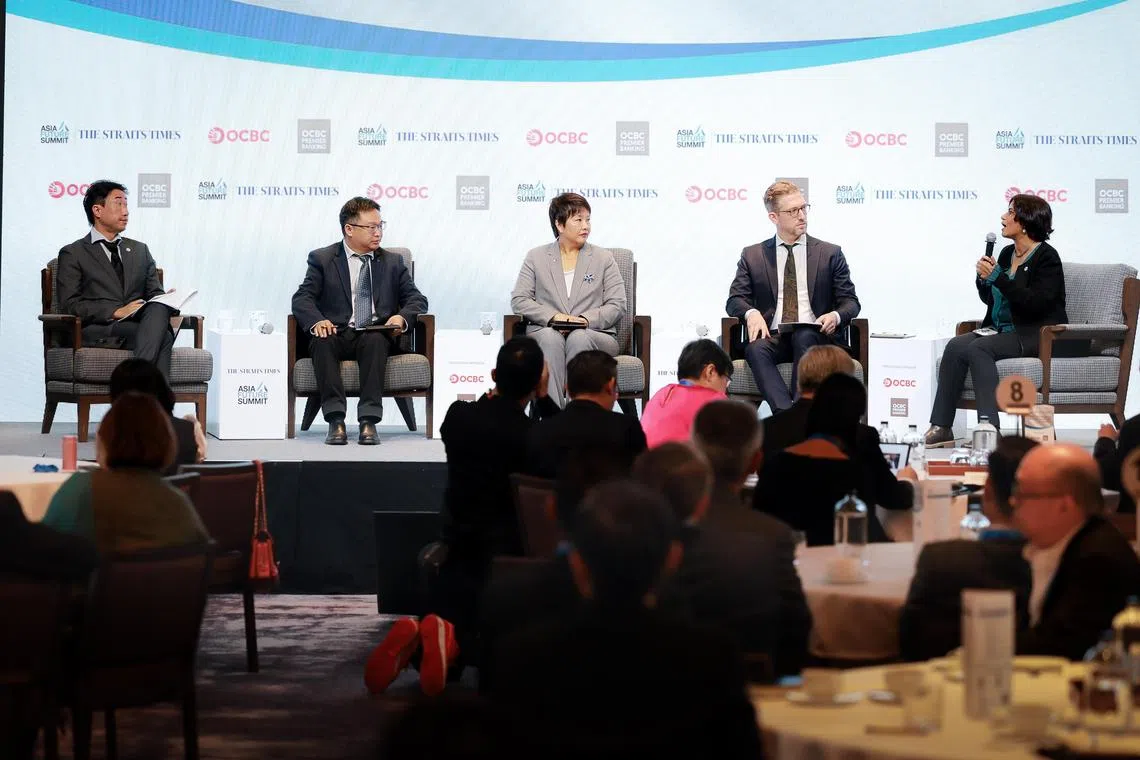Singapore’s interests will always be at the core of its foreign policy: Chee Hong Tat
The city-state must make tough decisions when necessary and remain relevant by value-adding to the world, he says at Asia Future Summit

SINGAPORE’S interests will always be at the core of its foreign policy. And in times of disagreement when engaging with other countries, Singapore must be prepared to speak up and make tough decisions when necessary to advance, protect its interests as well as maintain its credibility.
Transport Minister and Second Finance Minister Chee Hong Tat made these points on Tuesday (Nov 12) at The Straits Times’ Asia Future Summit 2024, an event presented by OCBC. At a fireside chat, he said that as a small country, Singapore must continue to remain relevant by looking for ways to value-add to the world.
With Donald Trump set to serve a second term as US president from January, countries around the world are concerned about America turning more inward-looking.
“We hope we can persuade our American friends that it is still very important for the US to remain engaged in Asia-Pacific... not just in terms of security and defence, but also trade, investments and economic development,” said Chee.
He noted that a fundamental factor affecting US-China relations is strategic competition between the two largest superpower economies in the world. He hopes that the two superpowers can continue with their dialogue and look for areas of common interest.
Where there may be differences, perhaps even opposing interests, it is paramount for them to keep the conversation going instead of ending up with something more serious, such as a conflict or confrontation, he said.
Navigate Asia in
a new global order
Get the insights delivered to your inbox.
As for Singapore, Chee hopes that it can remain friends with both the US and China. “Singapore can be a place where different countries – including American companies, Chinese companies, and also companies from the region – can come and use this as a regional hub, as an innovation launchpad, to start new ventures and bring in new ideas,” he said.
Responding to a question about Asean increasingly becoming less relevant and how this risk can be managed, Chee said that the construct of Asean has led to peace and stability in the region for many years. While it is not a perfect system, it has achieved its purpose on the whole; and going forward, there are two areas to look at for further improvement.
The first is to identify the common challenges or benefits for the region as a whole to strengthen integration. Chee highlighted that there are areas – be it in trade, investments, capability building or infrastructure, such as the Asean power grid – that can be win-win for the whole region.
The second area is to examine how to deal with the common challenges, such as climate change and the problem of an ageing population confronting countries such as Singapore. Chee views these as opportunities to look at new investments and innovations that can be tested with the populations in different parts of Asean, where if successful, can become solutions that help other parts of the world.
What to expect for US-China relations

At a separate session at the event, panellists spoke about what to expect for US-China relations.
Chen Dingding, a professor of international relations at Jinan University, expressed optimism that the US-China relationship will survive Trump 2.0.
He noted that China’s trade numbers with the US increased between 2018 (when Trump started the trade war) and 2023. A lot of Chinese trade goes to Vietnam, Mexico and other countries, with the US as the final destination.
Thus, as long as American consumers require goods and services from China and other markets, the relationship between the two largest superpowers is expected to survive.
On derisking, OCBC chief economist Selena Ling said that this is already happening where even within China, many Chinese companies have increased their outbound foreign direct investment into the region.
She pointed out that economies around the world will experience a big push to broaden their markets and products to be less dependent on just the US or China, as well as look for other drivers of growth and trade that are not solely dependent on the US and China.
On the trade front, Blake Berger, a consultant for the Asia Society Policy Institute, said that South-east Asian countries should be concerned about their trade relationships with the US, given that Trump has proposed a 10 to 20 per cent tariffs on all imports. This is especially so for countries such as Vietnam, Malaysia and Thailand that have significant trade surpluses with the US.
In addition, Berger noted that the increase in US tariffs on China could potentially redirect Chinese excess industrial capacity and goods to the region, thereby resulting in a knock-on effect.
Decoding Asia newsletter: your guide to navigating Asia in a new global order. Sign up here to get Decoding Asia newsletter. Delivered to your inbox. Free.
Copyright SPH Media. All rights reserved.

